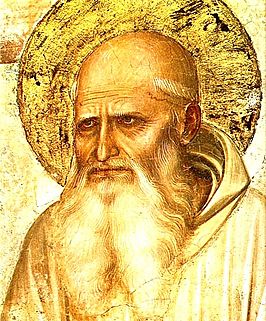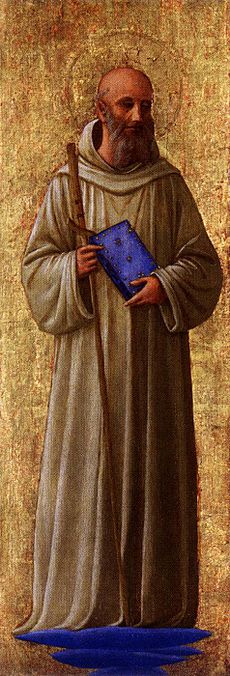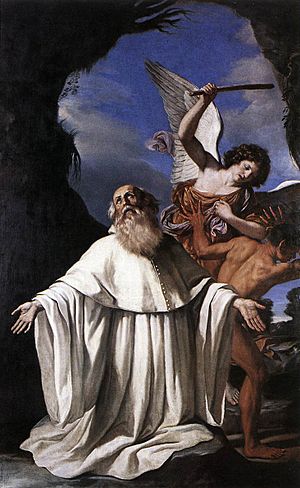Romuald facts for kids
Quick facts for kids SaintRomuald |
|
|---|---|
 |
|
| Abbot | |
| Born | c. 951 Ravenna |
| Died | 19 June 1027 Val di Castro |
| Venerated in | Roman Catholic Church |
| Feast | 19 June 7 February (1595–1969) |
Saint Romuald (born around 951 AD, died June 19, 1027 AD) was an important religious leader. He started the Camaldolese order of monks. He was also a key figure in a movement to bring back the simple, solitary life of hermits in the 11th century. Romuald spent about 30 years traveling across Italy. During this time, he founded and improved many monasteries and hermitages.
Contents
Romuald's Early Life and Calling
Romuald was born in Ravenna, Italy, into a rich family called Onesti. His father was Sergius degli Onesti. When Romuald was about 20, he saw his father kill a relative in a fight over land. This event deeply upset Romuald.
He went to the Basilica of Sant'Apollinare in Classe to pray and do penance for 40 days. After thinking deeply, Romuald decided to become a monk there. The monastery had recently been reformed by St. Mayeul of Cluny Abbey. However, Romuald found the rules still not strict enough.
His strong desire for a stricter life caused problems with other monks. So, he moved to Venice. There, he learned from a hermit named Marinus. Romuald lived a very strict and simple life with Marinus.

Travels and Founding Monasteries
Around 978, Romuald met Pietro Orseolo I, who was the leader (Doge) of Venice. Pietro decided to leave his important job and become a monk. He went to a monastery called Cuxa in Spain. Romuald and Marinus built a hermitage nearby. Romuald stayed there for about ten years. He used the monastery's library to develop his ideas about how monks should live.
After this, Romuald spent the next 30 years traveling. He founded and reformed many monasteries and hermitages across Italy. His fame reached the Holy Roman Emperor Otto III. The Emperor asked Romuald to become the abbot (leader) of Sant'Apollinare. Otto hoped Romuald could make the monks there live a more dedicated life.
However, the monks did not want to change. After a year, Romuald was so frustrated that he quit. He threw his abbot's staff at Otto's feet. Then, he went back to living as a hermit.
Founding the Camaldolese Order
In 1012, Romuald came to the area of Arezzo. Legend says a man named Maldolus had a vision of monks in white robes going up to Heaven. Maldolus then gave Romuald some land. This land became known as Campus Maldoli, or Camaldoli.
Saint Romuald built five small cells for hermits on this land. Two years later, a monastery was built at Fontebuono. These two places became the main centers for the famous Camaldolese Order. Romuald's strong personality impressed Rainier of Tuscany. Rainier was unable to either face Romuald or send him away. Romuald founded several other monasteries, including Val di Castro. He died there in 1027.
Romuald's feast day is celebrated on June 19. This is the day he died.

Saint Romuald's Teachings
When he was young, Romuald learned about three main ways of monastic life. Sant'Apollinare in Classe followed the traditional Benedictine rules. These rules were influenced by the Cluniac reforms. Marinus, his teacher, lived a much harder, more solitary life. This style came from Irish hermits. The abbot of Sant Miguel de Cuxa, Guarinus, also started reforms. His ideas were based on Christian traditions from Spain.
Romuald combined these different ideas. He created his own way of monastic life. A famous quote from his rule is: Empty yourself completely and sit waiting. This teaching is about being still and quiet inside. It is similar to an old Christian practice called Hesychasm.
Here are some of his famous words:
- Sit in your cell as in paradise. Put the whole world behind you and forget it. Watch your thoughts like a good fisherman watching for fish. The path you must follow is in the Psalms — never leave it.
- If you have just come to the monastery, and in spite of your good will you cannot accomplish what you want, take every opportunity you can to sing the Psalms in your heart and to understand them with your mind. And if your mind wanders as you read, do not give up; hurry back and apply your mind to the words once more.
Archbishop Cosmo Francesco Ruppi said that Romuald's teachings focus on:
- Deep spiritual thought.
- The importance of quiet time alone and thinking.
- Slowly understanding the Word of God.
- Calmly thinking about the Psalms.
Romuald's reforms allowed for both solitary (hermit) and community (monastery) ways of life.
See also
 In Spanish: Romualdo para niños
In Spanish: Romualdo para niños
- Catholic Church in Italy
- List of Catholic saints
- Saint Romuald, patron saint archive
 | DeHart Hubbard |
 | Wilma Rudolph |
 | Jesse Owens |
 | Jackie Joyner-Kersee |
 | Major Taylor |

